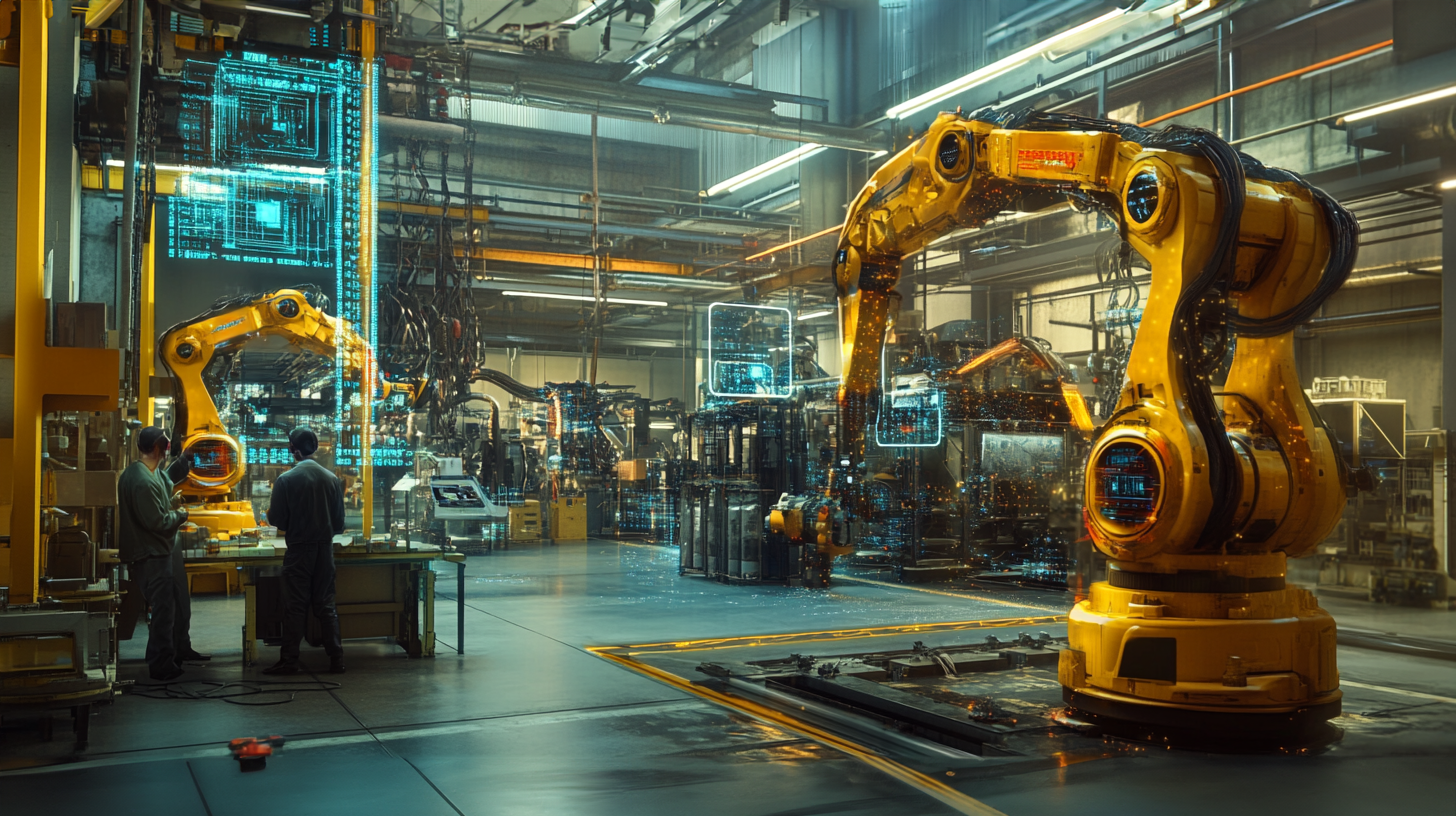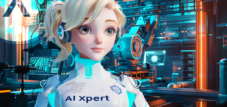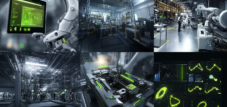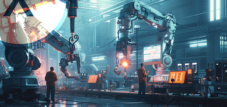Smart Machine: Intelligent mechanical engineering and industry with AI agents: algorithm-controlled software-based systems
Xpert pre-release
Language selection 📢
Published on: December 25, 2024 / Update from: December 25, 2024 - Author: Konrad Wolfenstein

Smart Machine: Intelligent mechanical engineering and industry with AI agents: Algorithm-controlled software-based systems – Image: Xpert.Digital
Artificial intelligence agents in focus: This is how companies optimize mechanical engineering and production
Use of AI agents in mechanical engineering and industry
The rapid development of artificial intelligence (AI) has triggered an enormous boost in almost all industries in recent years. Mechanical engineering and industrial production in particular benefit greatly from this technology. AI agents give companies the opportunity to optimize their processes and increase productivity while reducing operating costs. But what exactly are AI agents and how do they contribute to the transformation of mechanical engineering and industry?
What are AI agents?
AI agents are software-based systems controlled by algorithms and capable of acting autonomously, making decisions and solving problems. They are often based on machine learning, a subset of AI, and can continually improve their capabilities by analyzing large amounts of data. In an industrial context, these agents are specifically designed to take on complex tasks that previously required human intervention.
A typical example of AI agents is a predictive maintenance system that analyzes data from sensors in machines to detect early wear or potential failures. This proactive approach can minimize downtime and extend the life of machines.
The advantages of AI in mechanical engineering
The use of AI agents in mechanical engineering brings numerous advantages. One of the most important is the ability to automate processes. AI agents can efficiently and accurately take on repetitive tasks that are often tedious and error-prone for human workers. This allows employees to concentrate on strategic and creative activities.
Other benefits include:
- Increased efficiency: Through the use of AI, production cycles can be optimized and resources can be used better. For example, AI agents analyze manufacturing processes in real time and suggest adjustments to reduce material usage.
- Quality improvement: AI systems can detect errors in production faster and more accurately than traditional quality controls. This leads to a significant reduction in the scrap rate.
- Flexibility: Modern production environments require a high level of flexibility in order to quickly adapt to market changes. AI agents make it possible to dynamically change production lines and thus react more quickly to new requirements.
Application examples in industry
1. Predictive maintenance
A central area of application for AI agents in mechanical engineering is predictive maintenance. Sensors on machines continuously collect data such as temperature, vibrations or pressure. AI agents analyze this data in real time and identify patterns that could indicate an impending failure. This allows maintenance work to be planned and unplanned downtime to be avoided.
2. Supply chain optimization
AI agents also play a crucial role in logistics. They help make supply chains more efficient by forecasting demand, optimizing inventory levels, and planning transportation routes. In a world where supply chains are becoming increasingly complex, such systems offer an invaluable competitive advantage.
3. Robotics and automation
In manufacturing, AI-controlled robots are no longer a vision of the future. These robots can not only carry out pre-programmed movements, but also learn independently and adapt to new tasks through the use of AI. This enables flexible automation that was previously unthinkable.
4. Digital twin
The digital twin is another example of the successful use of AI agents. This is a virtual image of a physical machine or system. By simulating processes, AI agents can identify potential vulnerabilities and make optimization suggestions before implementing changes in the real world.
Challenges when using AI agents
Despite the numerous advantages, there are also challenges that companies must overcome when using AI agents in mechanical engineering and industry. These include:
Data security
Because AI systems rely on large amounts of sensitive data, protecting this information is a top priority. A data leak could have serious consequences for the company.
Implementation complexity
The integration of AI agents into existing systems is often complex and requires specialist knowledge. Companies need to invest in training their employees and adapting their infrastructure.
Employee acceptance
The use of AI can cause uncertainty among employees, especially if there are fears that jobs are at risk from automation. Transparent communication and the involvement of the workforce in the change are crucial here.
An exciting trend is the combination with AI
The future of mechanical engineering and industrial production will undoubtedly be shaped by AI technologies. AI agents are expected to become even smarter and more versatile. An exciting trend is the combination of AI with other breakthrough technologies such as the Internet of Things (IoT) and blockchain.
- IoT and AI: By connecting IoT devices with AI agents, companies can create a fully connected production environment. This enables even more precise data collection and analysis.
- Blockchain and AI: Blockchain technology can be used to improve traceability and security in the supply chain. AI agents could analyze this data and make even more informed decisions.
In addition, AI agents will be able to act not only based on historical data, but also based on scenario models. This opens up completely new possibilities for minimizing risks and exploiting opportunities.
The use of AI agents in mechanical engineering and industry is a game changer. From predictive maintenance to supply chain optimization to flexible automation – the potential is almost unlimited. At the same time, companies must keep an eye on challenges such as data security, implementation complexity and employee acceptance. However, with the right strategy and a clear focus on innovation, companies can benefit from the countless opportunities that AI agents offer.
The future belongs to the companies that have the courage to use this transformative technology and continuously develop. Artificial intelligence will not only revolutionize mechanical engineering, but also the way we think and design industrial processes.
🔄📈 B2B trading platforms support – strategic planning and support for exports and the global economy with Xpert.Digital 💡
Business-to-business (B2B) trading platforms have become a critical part of global trade dynamics and thus a driving force for exports and global economic development. These platforms offer significant benefits to companies of all sizes, particularly SMEs – small and medium-sized businesses – which are often considered the backbone of the German economy. In a world where digital technologies are becoming increasingly prominent, the ability to adapt and integrate is crucial to success in global competition.
More about it here:
The use of AI agents in mechanical engineering and industry: algorithm-controlled software-based systems
Diverse areas of application in mechanical engineering and industry
The possible uses of AI agents in mechanical engineering and industry are wide-ranging and are constantly evolving. Some of the most important areas of application are:
Intelligent production planning and control
AI agents analyze huge amounts of data from production processes to identify bottlenecks, predict maintenance requirements and optimize production processes. You can make adjustments independently to maximize efficiency, to shorten throughput times and to optimally use resources. Instead of manually creating production plans that are often static and inflexible, AI agents can develop dynamic plans that adapt to changed conditions in real time, for example to the availability of raw materials, machine failures or changed demand forecasts. For example, “AI-based systems can optimize the order of production steps in order to minimize set-up times and improve the material flow”.
Predictive maintenance
Machine failures can lead to significant production failures and high costs. AI agents analyze sensor data of machines and systems to recognize anomalies that indicate upcoming defects. Due to the early detection of potential problems, maintenance work can be planned and carried out proactively before failure. This leads to reduced downtimes, lower repair costs and a longer lifespan of the systems. "Due to the continuous monitoring of vibration patterns, temperature data and noise development, AI-agent can recognize subtle changes that might miss human observers", which enables early intervention.
Quality control
Ensuring high product quality is a central concern in mechanical engineering and in industry. AI agents can be used in inspection processes to check products for errors and defects. They analyze pictures, videos and other data to recognize deviations from the quality standards - and that with a speed and accuracy that human inspectors often exceeds. "This ability to identify the smallest defects that could be invisible to the human eye makes a decisive contribution to reducing committee and increasing customer satisfaction". In addition, the agents learn continuously from the inspection data and thus improve their identification skills over time.
Robotics and automation
AI agents play a crucial role in the further development of robotics and automation in industry. They enable robots to take on more complex tasks that go beyond simple, repetitive movements. With the help of AI, robots can understand their surroundings, adapt to changed situations and work safely with people. "Intelligent robot arms, controlled by AI agents, can, for example, carry out complex assembly tasks, precisely position components and react flexibly to unforeseen obstacles". This leads to further automation of production processes, a reduction in manual work and an increase in productivity.
Supply chain optimization
The supply chain is a complex network of processes and actors. AI agents can help to cope with this complexity by analyzing data from various sources, such as inventory, transport logistics and demand forecasts. You can identify bottlenecks and inefficiencies in the supply chain and make optimization suggestions, for example the choice of the best transport routes, the adjustment of order quantities or the prediction of delivery delays. "With the intelligent analysis of market data and logistical information, AI agents can help reduce the storage costs, to shorten delivery times and to improve the responsiveness of the supply chain to changes".
Product development and design
AI agents can support engineers and designers in developing new products. By analyzing performance data of existing products, customer feedback and market trends, you can provide valuable insights that flow into the design process. You can also support generative design tools in which AI algorithms automatically generate design suggestions that meet certain requirements and boundary conditions. "These AI-based design processes make it possible to develop innovative and optimized product solutions faster and more efficiently".
Personalization and customer interaction: Even in the area of customer relationship management, AI agents can create added value. You can edit customer inquiries, provide technical support and give personalized recommendations. "Chatbots based on AI agents can answer customer questions around the clock, record orders and help solve problems". This improves customer satisfaction and relieves human employees.
Use of AI agents
The use of AI agents in mechanical engineering and industry offers a variety of advantages:
- Increased efficiency and productivity: By automating tasks, optimizing processes and reducing downtime, AI agents help significantly increase efficiency and productivity.
- Cost reduction: Optimizing processes, reducing waste, predictive maintenance and improving resource utilization result in significant cost savings.
- Improved Quality: Precise quality control by AI agents helps improve product quality and reduce errors.
- Increased safety: In dangerous work environments, AI-controlled robots can take on tasks that would be risky for humans. In addition, AI agents can detect safety risks and issue alerts to prevent accidents.
- Innovation and competitive advantages: The use of AI agents enables companies to develop innovative products and services and secure a competitive advantage.
- Better decision making: AI agents can analyze large amounts of data and make informed decisions based on facts and analysis.
Despite the numerous advantages, there are also challenges and considerations when using AI agents:
- Data requirements: AI agents require large amounts of high-quality data to learn and function effectively. Collecting, processing and securing this data can be challenging.
- Complexity and Integration: Implementing AI agents can be complex and often requires integration with existing systems and processes.
- Cost: The development and implementation of AI agents can be associated with considerable costs. Ethics and social effects: The use of AI agents raises ethical questions, especially with regard to job losses and dealing with algorithms, the decisions of which may not always be understandable. It is important that "the development and use of AI systems are designed transparently and understandably in order to create trust and minimize possible negative social effects".
- Security: AI systems can be vulnerable to attacks and manipulation. It is important to implement appropriate security measures to ensure the integrity and reliability of AI agents.
- User acceptance and training: The successful implementation of AI agents requires acceptance by the employees and the provision of relevant training in order to be able to deal with the new technologies. "The integration of employees in the implementation process and the clear communication of the advantages of AI systems are crucial for successful acceptance".
The future of AI agents in mechanical engineering and industry
In the future it can be expected that AI agents become even more intelligent, autonomous and more versatile. You will be able to take on even more complex tasks, to better adapt to changed environments and to work more closely with people. "The fusion of AI with other technologies such as the Internet of Things (IoT) and the cloud will open up new opportunities for the use of intelligent agents in industry".
Some future trends are:
- Reinforcement learning: AI agents will learn through interaction with their environment and continually improve their skills without relying on explicit programming.
- Federated learning: AI agents will be able to learn from data distributed across different devices and systems without the need to store that data centrally. This is particularly relevant for companies with sensitive data.
- Explainable AI (XAI): It is becoming increasingly important that the decisions of AI agents are traceable and understandable in order to build trust and address ethical concerns.
- Swarm intelligence: Collaboration between multiple AI agents will make it possible to solve complex problems that a single agent could not handle.
- Edge computing: AI agents are deployed directly on the devices and machines instead of relying on central servers. This enables faster response times and reduces dependence on the network connection.
AI agents are a transformative force in engineering and industry. They offer enormous potential to increase efficiency, reduce costs, improve quality and promote innovation. Although there are challenges in implementation and use, the benefits clearly outweigh them. Companies that rely on this technology early on and make the necessary investments will secure a decisive competitive advantage and play a significant role in shaping the future of production. The continuous development of AI technology will further expand the possible uses of AI agents in the coming years and sustainably change the industrial landscape.
We are there for you - advice - planning - implementation - project management
☑️ SME support in strategy, consulting, planning and implementation
☑️ Creation or realignment of the digital strategy and digitalization
☑️ Expansion and optimization of international sales processes
☑️ Global & Digital B2B trading platforms
☑️ Pioneer Business Development
I would be happy to serve as your personal advisor.
You can contact me by filling out the contact form below or simply call me on +49 89 89 674 804 (Munich) .
I'm looking forward to our joint project.
Xpert.Digital - Konrad Wolfenstein
Xpert.Digital is a hub for industry with a focus on digitalization, mechanical engineering, logistics/intralogistics and photovoltaics.
With our 360° business development solution, we support well-known companies from new business to after sales.
Market intelligence, smarketing, marketing automation, content development, PR, mail campaigns, personalized social media and lead nurturing are part of our digital tools.
You can find out more at: www.xpert.digital - www.xpert.solar - www.xpert.plus


























